Using Ethical Approach: Evaluating Public Health Policy in England
VerifiedAdded on 2023/01/19
|12
|4328
|89
Report
AI Summary
This report critically evaluates the 'Towards a Smoke free Generation - A Tobacco Control Plan for England' policy from an ethical perspective. It begins by defining the policy and its objectives, which include reducing tobacco use and creating a smoke-free generation through various regulations and strategies. The introduction highlights the ethical principles underpinning the policy, such as reducing harm and promoting public health. The main discussion delves into the ethical guidance and regulations, including legal frameworks like the Health and Social Care Act and the Equality Act. It then evaluates ethical theories such as utilitarianism, deontology, and virtue ethics in the context of the policy. The report also reflects on personal and professional values in public health practice, emphasizing the importance of ethical decision-making and the role of values in influencing behavior. The evaluation considers the role of research and evidence-based approaches. The report concludes with recommendations and a summary of the ethical considerations, emphasizing the need for a balanced approach that considers individual rights and public health goals.
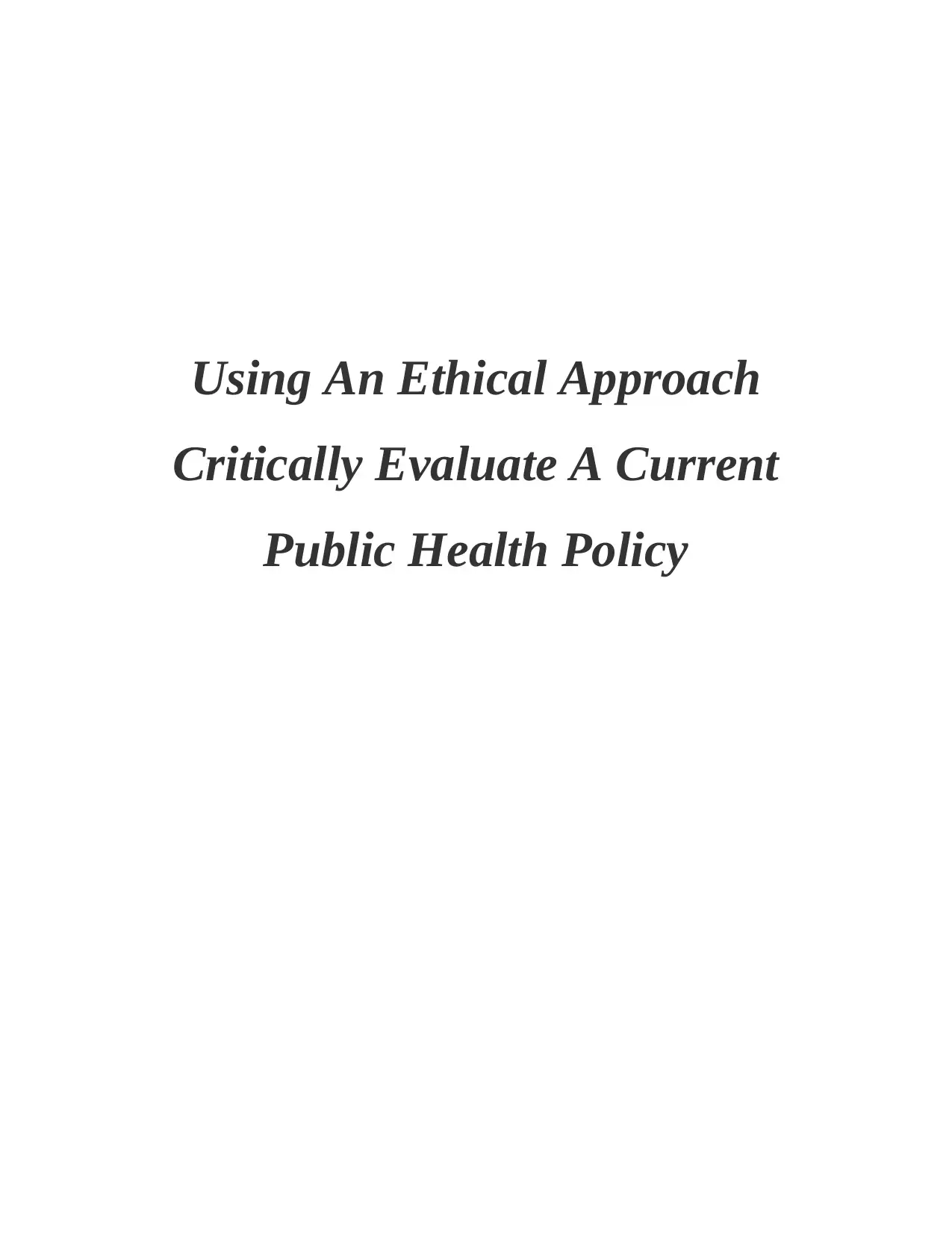
Using An Ethical Approach
Critically Evaluate A Current
Public Health Policy
Critically Evaluate A Current
Public Health Policy
Paraphrase This Document
Need a fresh take? Get an instant paraphrase of this document with our AI Paraphraser
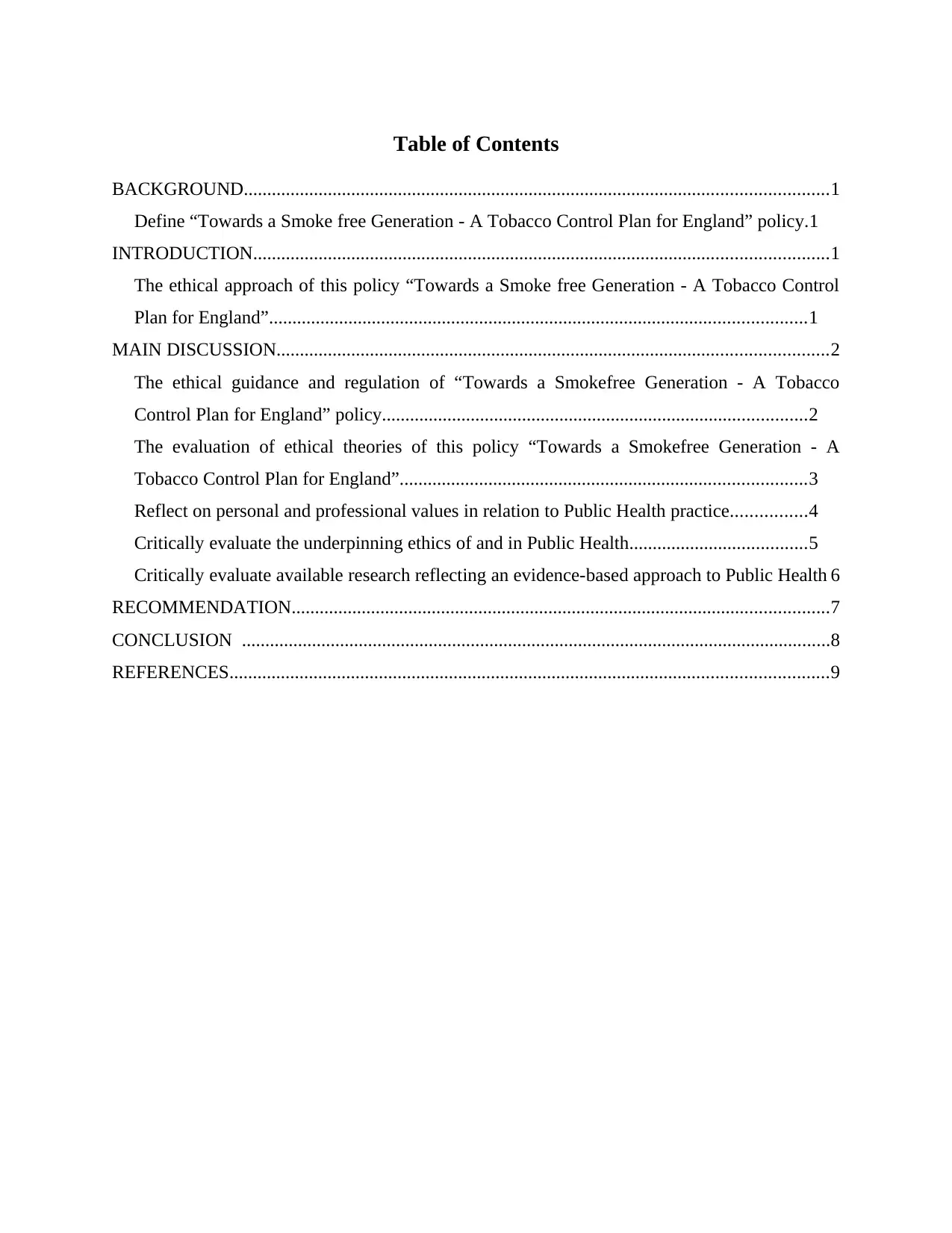
Table of Contents
BACKGROUND.............................................................................................................................1
Define “Towards a Smoke free Generation - A Tobacco Control Plan for England” policy.1
INTRODUCTION...........................................................................................................................1
The ethical approach of this policy “Towards a Smoke free Generation - A Tobacco Control
Plan for England”...................................................................................................................1
MAIN DISCUSSION......................................................................................................................2
The ethical guidance and regulation of “Towards a Smokefree Generation - A Tobacco
Control Plan for England” policy...........................................................................................2
The evaluation of ethical theories of this policy “Towards a Smokefree Generation - A
Tobacco Control Plan for England”.......................................................................................3
Reflect on personal and professional values in relation to Public Health practice................4
Critically evaluate the underpinning ethics of and in Public Health......................................5
Critically evaluate available research reflecting an evidence-based approach to Public Health 6
RECOMMENDATION...................................................................................................................7
CONCLUSION ..............................................................................................................................8
REFERENCES................................................................................................................................9
BACKGROUND.............................................................................................................................1
Define “Towards a Smoke free Generation - A Tobacco Control Plan for England” policy.1
INTRODUCTION...........................................................................................................................1
The ethical approach of this policy “Towards a Smoke free Generation - A Tobacco Control
Plan for England”...................................................................................................................1
MAIN DISCUSSION......................................................................................................................2
The ethical guidance and regulation of “Towards a Smokefree Generation - A Tobacco
Control Plan for England” policy...........................................................................................2
The evaluation of ethical theories of this policy “Towards a Smokefree Generation - A
Tobacco Control Plan for England”.......................................................................................3
Reflect on personal and professional values in relation to Public Health practice................4
Critically evaluate the underpinning ethics of and in Public Health......................................5
Critically evaluate available research reflecting an evidence-based approach to Public Health 6
RECOMMENDATION...................................................................................................................7
CONCLUSION ..............................................................................................................................8
REFERENCES................................................................................................................................9
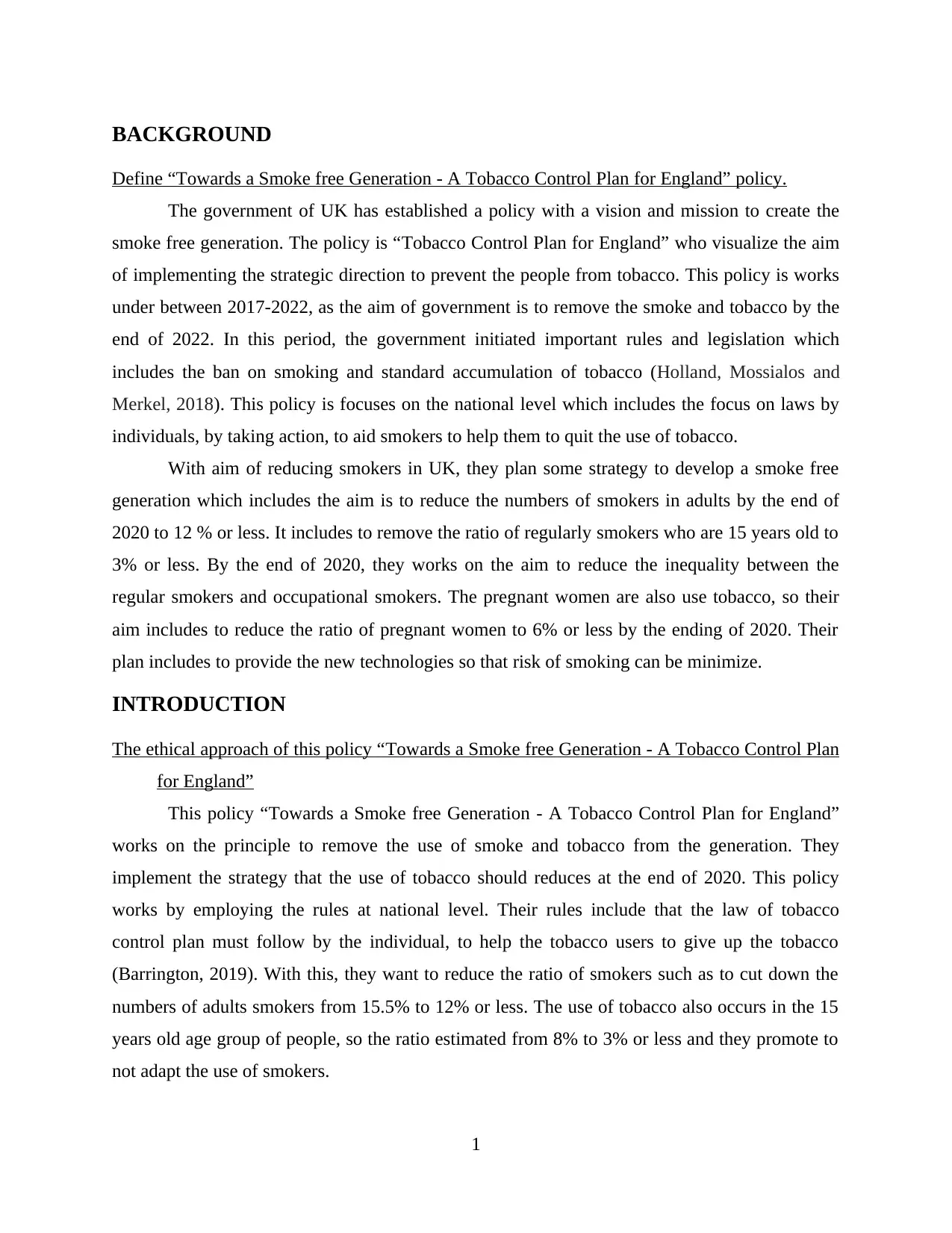
BACKGROUND
Define “Towards a Smoke free Generation - A Tobacco Control Plan for England” policy.
The government of UK has established a policy with a vision and mission to create the
smoke free generation. The policy is “Tobacco Control Plan for England” who visualize the aim
of implementing the strategic direction to prevent the people from tobacco. This policy is works
under between 2017-2022, as the aim of government is to remove the smoke and tobacco by the
end of 2022. In this period, the government initiated important rules and legislation which
includes the ban on smoking and standard accumulation of tobacco (Holland, Mossialos and
Merkel, 2018). This policy is focuses on the national level which includes the focus on laws by
individuals, by taking action, to aid smokers to help them to quit the use of tobacco.
With aim of reducing smokers in UK, they plan some strategy to develop a smoke free
generation which includes the aim is to reduce the numbers of smokers in adults by the end of
2020 to 12 % or less. It includes to remove the ratio of regularly smokers who are 15 years old to
3% or less. By the end of 2020, they works on the aim to reduce the inequality between the
regular smokers and occupational smokers. The pregnant women are also use tobacco, so their
aim includes to reduce the ratio of pregnant women to 6% or less by the ending of 2020. Their
plan includes to provide the new technologies so that risk of smoking can be minimize.
INTRODUCTION
The ethical approach of this policy “Towards a Smoke free Generation - A Tobacco Control Plan
for England”
This policy “Towards a Smoke free Generation - A Tobacco Control Plan for England”
works on the principle to remove the use of smoke and tobacco from the generation. They
implement the strategy that the use of tobacco should reduces at the end of 2020. This policy
works by employing the rules at national level. Their rules include that the law of tobacco
control plan must follow by the individual, to help the tobacco users to give up the tobacco
(Barrington, 2019). With this, they want to reduce the ratio of smokers such as to cut down the
numbers of adults smokers from 15.5% to 12% or less. The use of tobacco also occurs in the 15
years old age group of people, so the ratio estimated from 8% to 3% or less and they promote to
not adapt the use of smokers.
1
Define “Towards a Smoke free Generation - A Tobacco Control Plan for England” policy.
The government of UK has established a policy with a vision and mission to create the
smoke free generation. The policy is “Tobacco Control Plan for England” who visualize the aim
of implementing the strategic direction to prevent the people from tobacco. This policy is works
under between 2017-2022, as the aim of government is to remove the smoke and tobacco by the
end of 2022. In this period, the government initiated important rules and legislation which
includes the ban on smoking and standard accumulation of tobacco (Holland, Mossialos and
Merkel, 2018). This policy is focuses on the national level which includes the focus on laws by
individuals, by taking action, to aid smokers to help them to quit the use of tobacco.
With aim of reducing smokers in UK, they plan some strategy to develop a smoke free
generation which includes the aim is to reduce the numbers of smokers in adults by the end of
2020 to 12 % or less. It includes to remove the ratio of regularly smokers who are 15 years old to
3% or less. By the end of 2020, they works on the aim to reduce the inequality between the
regular smokers and occupational smokers. The pregnant women are also use tobacco, so their
aim includes to reduce the ratio of pregnant women to 6% or less by the ending of 2020. Their
plan includes to provide the new technologies so that risk of smoking can be minimize.
INTRODUCTION
The ethical approach of this policy “Towards a Smoke free Generation - A Tobacco Control Plan
for England”
This policy “Towards a Smoke free Generation - A Tobacco Control Plan for England”
works on the principle to remove the use of smoke and tobacco from the generation. They
implement the strategy that the use of tobacco should reduces at the end of 2020. This policy
works by employing the rules at national level. Their rules include that the law of tobacco
control plan must follow by the individual, to help the tobacco users to give up the tobacco
(Barrington, 2019). With this, they want to reduce the ratio of smokers such as to cut down the
numbers of adults smokers from 15.5% to 12% or less. The use of tobacco also occurs in the 15
years old age group of people, so the ratio estimated from 8% to 3% or less and they promote to
not adapt the use of smokers.
1
⊘ This is a preview!⊘
Do you want full access?
Subscribe today to unlock all pages.

Trusted by 1+ million students worldwide
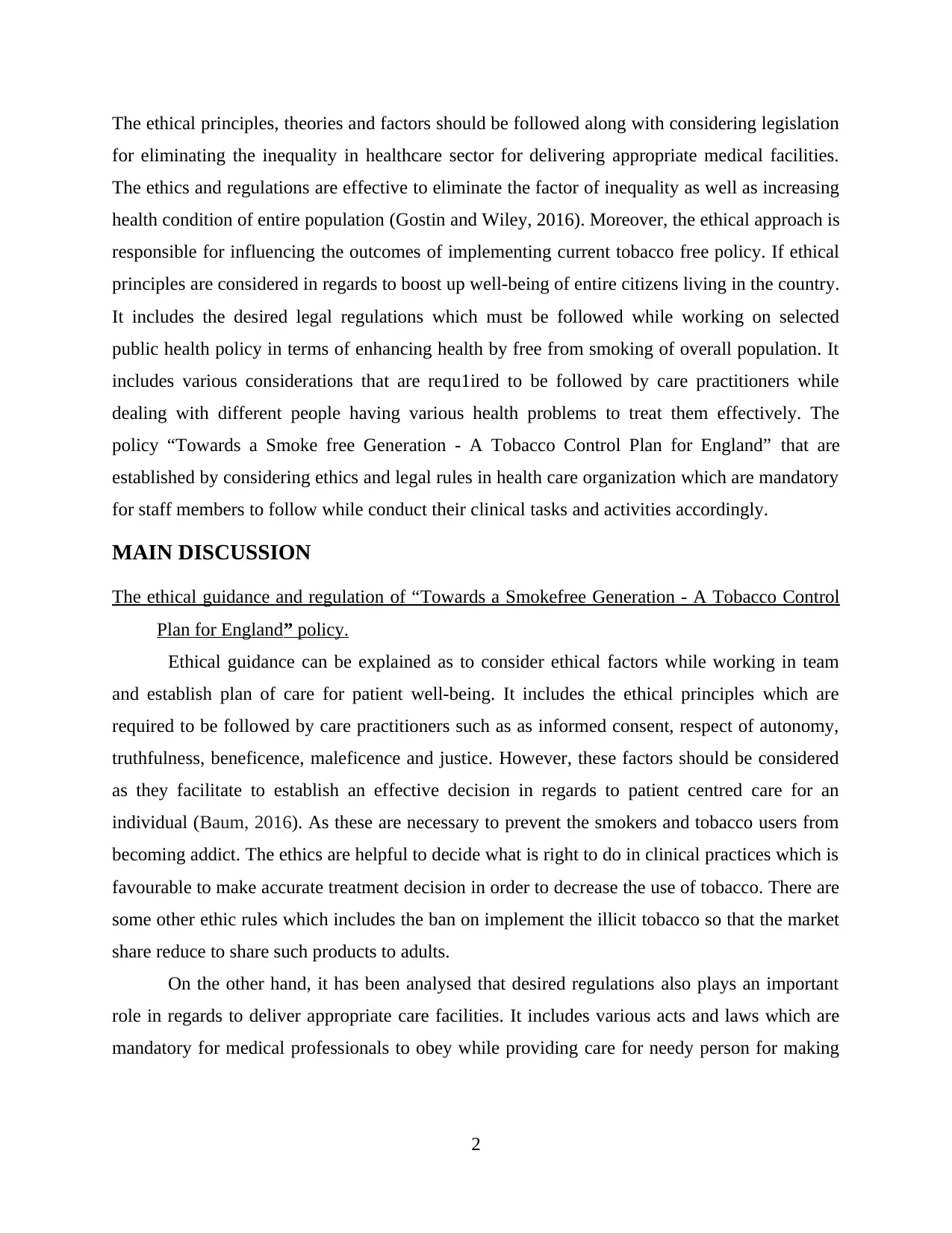
The ethical principles, theories and factors should be followed along with considering legislation
for eliminating the inequality in healthcare sector for delivering appropriate medical facilities.
The ethics and regulations are effective to eliminate the factor of inequality as well as increasing
health condition of entire population (Gostin and Wiley, 2016). Moreover, the ethical approach is
responsible for influencing the outcomes of implementing current tobacco free policy. If ethical
principles are considered in regards to boost up well-being of entire citizens living in the country.
It includes the desired legal regulations which must be followed while working on selected
public health policy in terms of enhancing health by free from smoking of overall population. It
includes various considerations that are requ1ired to be followed by care practitioners while
dealing with different people having various health problems to treat them effectively. The
policy “Towards a Smoke free Generation - A Tobacco Control Plan for England” that are
established by considering ethics and legal rules in health care organization which are mandatory
for staff members to follow while conduct their clinical tasks and activities accordingly.
MAIN DISCUSSION
The ethical guidance and regulation of “Towards a Smokefree Generation - A Tobacco Control
Plan for England” policy.
Ethical guidance can be explained as to consider ethical factors while working in team
and establish plan of care for patient well-being. It includes the ethical principles which are
required to be followed by care practitioners such as as informed consent, respect of autonomy,
truthfulness, beneficence, maleficence and justice. However, these factors should be considered
as they facilitate to establish an effective decision in regards to patient centred care for an
individual (Baum, 2016). As these are necessary to prevent the smokers and tobacco users from
becoming addict. The ethics are helpful to decide what is right to do in clinical practices which is
favourable to make accurate treatment decision in order to decrease the use of tobacco. There are
some other ethic rules which includes the ban on implement the illicit tobacco so that the market
share reduce to share such products to adults.
On the other hand, it has been analysed that desired regulations also plays an important
role in regards to deliver appropriate care facilities. It includes various acts and laws which are
mandatory for medical professionals to obey while providing care for needy person for making
2
for eliminating the inequality in healthcare sector for delivering appropriate medical facilities.
The ethics and regulations are effective to eliminate the factor of inequality as well as increasing
health condition of entire population (Gostin and Wiley, 2016). Moreover, the ethical approach is
responsible for influencing the outcomes of implementing current tobacco free policy. If ethical
principles are considered in regards to boost up well-being of entire citizens living in the country.
It includes the desired legal regulations which must be followed while working on selected
public health policy in terms of enhancing health by free from smoking of overall population. It
includes various considerations that are requ1ired to be followed by care practitioners while
dealing with different people having various health problems to treat them effectively. The
policy “Towards a Smoke free Generation - A Tobacco Control Plan for England” that are
established by considering ethics and legal rules in health care organization which are mandatory
for staff members to follow while conduct their clinical tasks and activities accordingly.
MAIN DISCUSSION
The ethical guidance and regulation of “Towards a Smokefree Generation - A Tobacco Control
Plan for England” policy.
Ethical guidance can be explained as to consider ethical factors while working in team
and establish plan of care for patient well-being. It includes the ethical principles which are
required to be followed by care practitioners such as as informed consent, respect of autonomy,
truthfulness, beneficence, maleficence and justice. However, these factors should be considered
as they facilitate to establish an effective decision in regards to patient centred care for an
individual (Baum, 2016). As these are necessary to prevent the smokers and tobacco users from
becoming addict. The ethics are helpful to decide what is right to do in clinical practices which is
favourable to make accurate treatment decision in order to decrease the use of tobacco. There are
some other ethic rules which includes the ban on implement the illicit tobacco so that the market
share reduce to share such products to adults.
On the other hand, it has been analysed that desired regulations also plays an important
role in regards to deliver appropriate care facilities. It includes various acts and laws which are
mandatory for medical professionals to obey while providing care for needy person for making
2
Paraphrase This Document
Need a fresh take? Get an instant paraphrase of this document with our AI Paraphraser
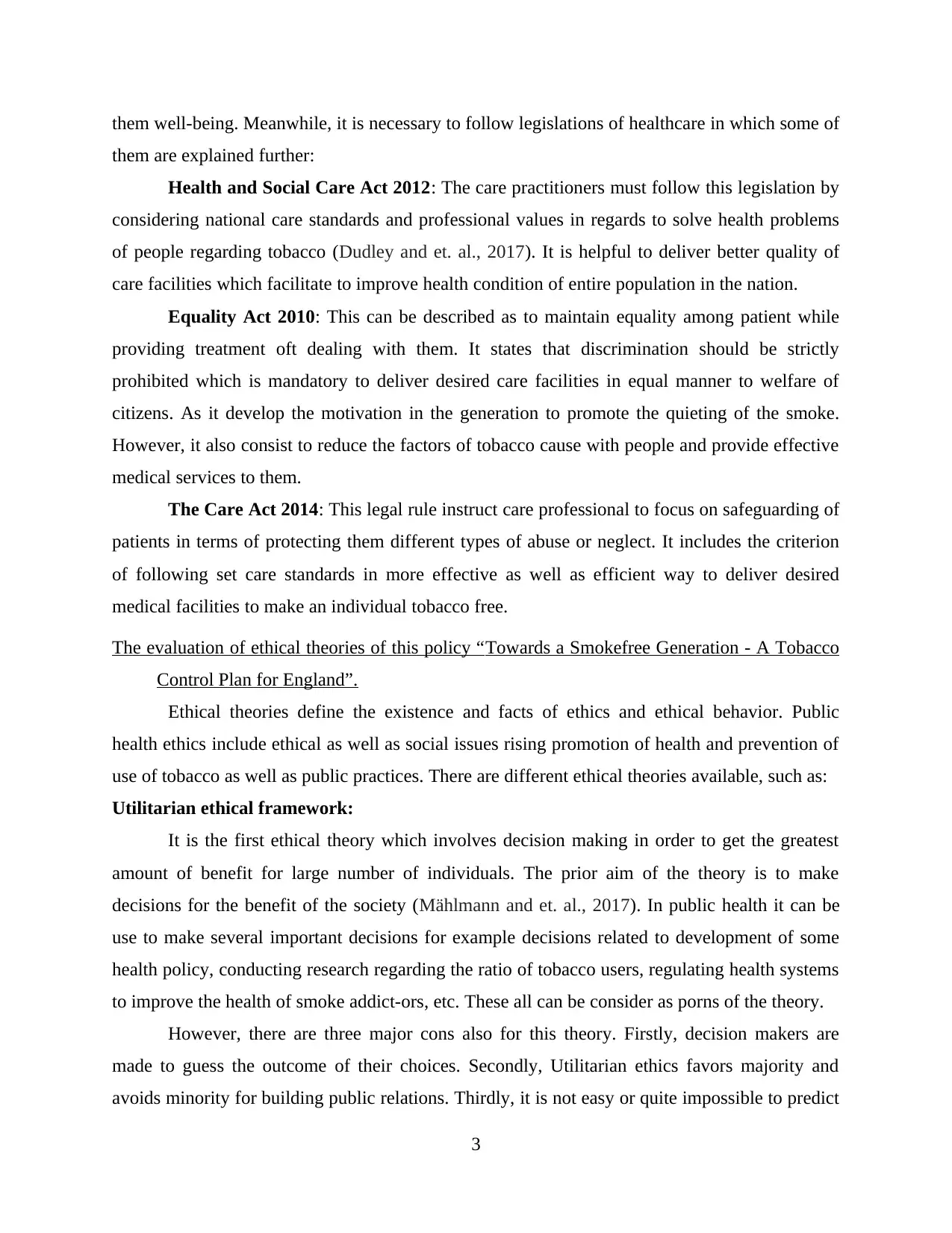
them well-being. Meanwhile, it is necessary to follow legislations of healthcare in which some of
them are explained further:
Health and Social Care Act 2012: The care practitioners must follow this legislation by
considering national care standards and professional values in regards to solve health problems
of people regarding tobacco (Dudley and et. al., 2017). It is helpful to deliver better quality of
care facilities which facilitate to improve health condition of entire population in the nation.
Equality Act 2010: This can be described as to maintain equality among patient while
providing treatment oft dealing with them. It states that discrimination should be strictly
prohibited which is mandatory to deliver desired care facilities in equal manner to welfare of
citizens. As it develop the motivation in the generation to promote the quieting of the smoke.
However, it also consist to reduce the factors of tobacco cause with people and provide effective
medical services to them.
The Care Act 2014: This legal rule instruct care professional to focus on safeguarding of
patients in terms of protecting them different types of abuse or neglect. It includes the criterion
of following set care standards in more effective as well as efficient way to deliver desired
medical facilities to make an individual tobacco free.
The evaluation of ethical theories of this policy “Towards a Smokefree Generation - A Tobacco
Control Plan for England”.
Ethical theories define the existence and facts of ethics and ethical behavior. Public
health ethics include ethical as well as social issues rising promotion of health and prevention of
use of tobacco as well as public practices. There are different ethical theories available, such as:
Utilitarian ethical framework:
It is the first ethical theory which involves decision making in order to get the greatest
amount of benefit for large number of individuals. The prior aim of the theory is to make
decisions for the benefit of the society (Mählmann and et. al., 2017). In public health it can be
use to make several important decisions for example decisions related to development of some
health policy, conducting research regarding the ratio of tobacco users, regulating health systems
to improve the health of smoke addict-ors, etc. These all can be consider as porns of the theory.
However, there are three major cons also for this theory. Firstly, decision makers are
made to guess the outcome of their choices. Secondly, Utilitarian ethics favors majority and
avoids minority for building public relations. Thirdly, it is not easy or quite impossible to predict
3
them are explained further:
Health and Social Care Act 2012: The care practitioners must follow this legislation by
considering national care standards and professional values in regards to solve health problems
of people regarding tobacco (Dudley and et. al., 2017). It is helpful to deliver better quality of
care facilities which facilitate to improve health condition of entire population in the nation.
Equality Act 2010: This can be described as to maintain equality among patient while
providing treatment oft dealing with them. It states that discrimination should be strictly
prohibited which is mandatory to deliver desired care facilities in equal manner to welfare of
citizens. As it develop the motivation in the generation to promote the quieting of the smoke.
However, it also consist to reduce the factors of tobacco cause with people and provide effective
medical services to them.
The Care Act 2014: This legal rule instruct care professional to focus on safeguarding of
patients in terms of protecting them different types of abuse or neglect. It includes the criterion
of following set care standards in more effective as well as efficient way to deliver desired
medical facilities to make an individual tobacco free.
The evaluation of ethical theories of this policy “Towards a Smokefree Generation - A Tobacco
Control Plan for England”.
Ethical theories define the existence and facts of ethics and ethical behavior. Public
health ethics include ethical as well as social issues rising promotion of health and prevention of
use of tobacco as well as public practices. There are different ethical theories available, such as:
Utilitarian ethical framework:
It is the first ethical theory which involves decision making in order to get the greatest
amount of benefit for large number of individuals. The prior aim of the theory is to make
decisions for the benefit of the society (Mählmann and et. al., 2017). In public health it can be
use to make several important decisions for example decisions related to development of some
health policy, conducting research regarding the ratio of tobacco users, regulating health systems
to improve the health of smoke addict-ors, etc. These all can be consider as porns of the theory.
However, there are three major cons also for this theory. Firstly, decision makers are
made to guess the outcome of their choices. Secondly, Utilitarian ethics favors majority and
avoids minority for building public relations. Thirdly, it is not easy or quite impossible to predict
3
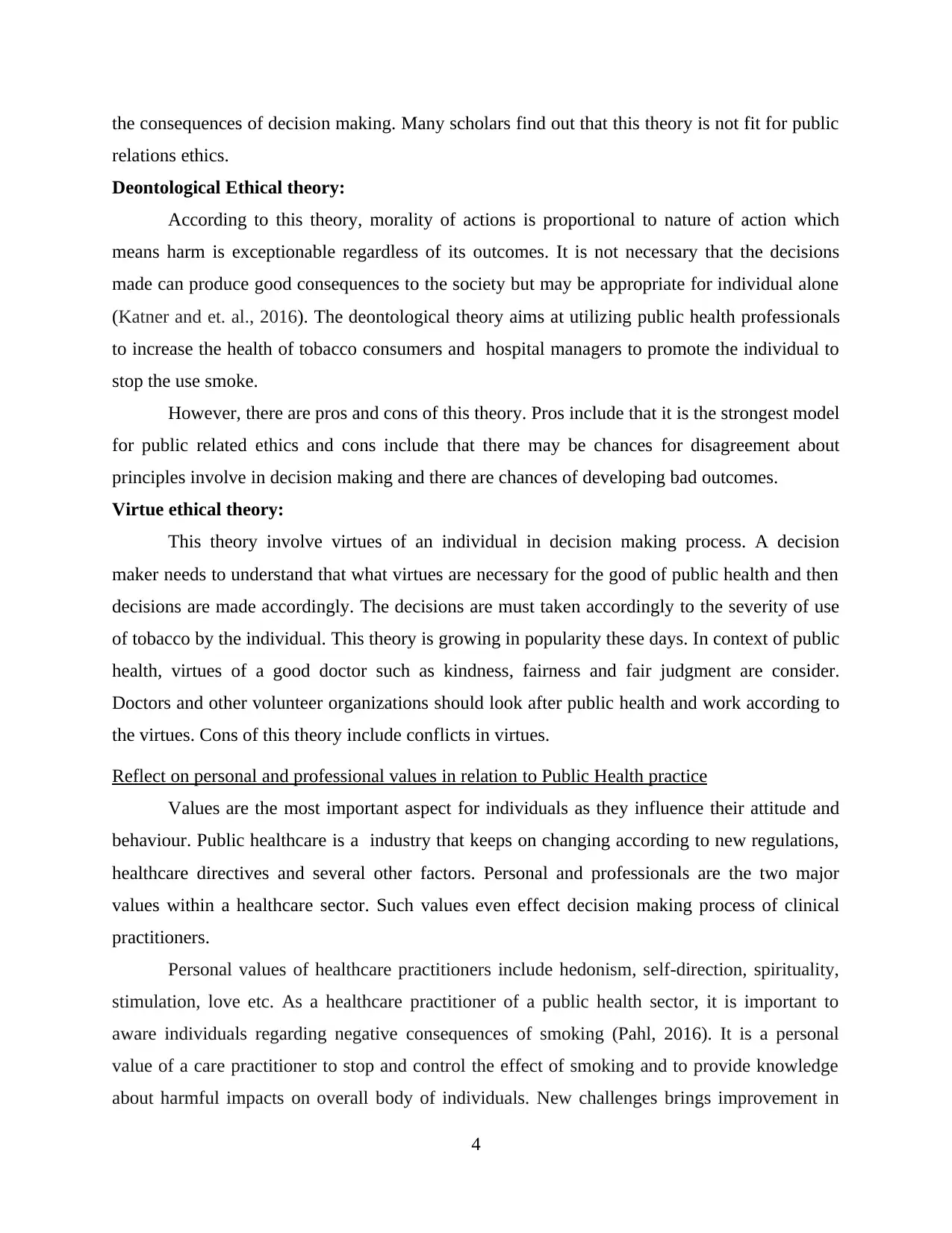
the consequences of decision making. Many scholars find out that this theory is not fit for public
relations ethics.
Deontological Ethical theory:
According to this theory, morality of actions is proportional to nature of action which
means harm is exceptionable regardless of its outcomes. It is not necessary that the decisions
made can produce good consequences to the society but may be appropriate for individual alone
(Katner and et. al., 2016). The deontological theory aims at utilizing public health professionals
to increase the health of tobacco consumers and hospital managers to promote the individual to
stop the use smoke.
However, there are pros and cons of this theory. Pros include that it is the strongest model
for public related ethics and cons include that there may be chances for disagreement about
principles involve in decision making and there are chances of developing bad outcomes.
Virtue ethical theory:
This theory involve virtues of an individual in decision making process. A decision
maker needs to understand that what virtues are necessary for the good of public health and then
decisions are made accordingly. The decisions are must taken accordingly to the severity of use
of tobacco by the individual. This theory is growing in popularity these days. In context of public
health, virtues of a good doctor such as kindness, fairness and fair judgment are consider.
Doctors and other volunteer organizations should look after public health and work according to
the virtues. Cons of this theory include conflicts in virtues.
Reflect on personal and professional values in relation to Public Health practice
Values are the most important aspect for individuals as they influence their attitude and
behaviour. Public healthcare is a industry that keeps on changing according to new regulations,
healthcare directives and several other factors. Personal and professionals are the two major
values within a healthcare sector. Such values even effect decision making process of clinical
practitioners.
Personal values of healthcare practitioners include hedonism, self-direction, spirituality,
stimulation, love etc. As a healthcare practitioner of a public health sector, it is important to
aware individuals regarding negative consequences of smoking (Pahl, 2016). It is a personal
value of a care practitioner to stop and control the effect of smoking and to provide knowledge
about harmful impacts on overall body of individuals. New challenges brings improvement in
4
relations ethics.
Deontological Ethical theory:
According to this theory, morality of actions is proportional to nature of action which
means harm is exceptionable regardless of its outcomes. It is not necessary that the decisions
made can produce good consequences to the society but may be appropriate for individual alone
(Katner and et. al., 2016). The deontological theory aims at utilizing public health professionals
to increase the health of tobacco consumers and hospital managers to promote the individual to
stop the use smoke.
However, there are pros and cons of this theory. Pros include that it is the strongest model
for public related ethics and cons include that there may be chances for disagreement about
principles involve in decision making and there are chances of developing bad outcomes.
Virtue ethical theory:
This theory involve virtues of an individual in decision making process. A decision
maker needs to understand that what virtues are necessary for the good of public health and then
decisions are made accordingly. The decisions are must taken accordingly to the severity of use
of tobacco by the individual. This theory is growing in popularity these days. In context of public
health, virtues of a good doctor such as kindness, fairness and fair judgment are consider.
Doctors and other volunteer organizations should look after public health and work according to
the virtues. Cons of this theory include conflicts in virtues.
Reflect on personal and professional values in relation to Public Health practice
Values are the most important aspect for individuals as they influence their attitude and
behaviour. Public healthcare is a industry that keeps on changing according to new regulations,
healthcare directives and several other factors. Personal and professionals are the two major
values within a healthcare sector. Such values even effect decision making process of clinical
practitioners.
Personal values of healthcare practitioners include hedonism, self-direction, spirituality,
stimulation, love etc. As a healthcare practitioner of a public health sector, it is important to
aware individuals regarding negative consequences of smoking (Pahl, 2016). It is a personal
value of a care practitioner to stop and control the effect of smoking and to provide knowledge
about harmful impacts on overall body of individuals. New challenges brings improvement in
4
⊘ This is a preview!⊘
Do you want full access?
Subscribe today to unlock all pages.

Trusted by 1+ million students worldwide
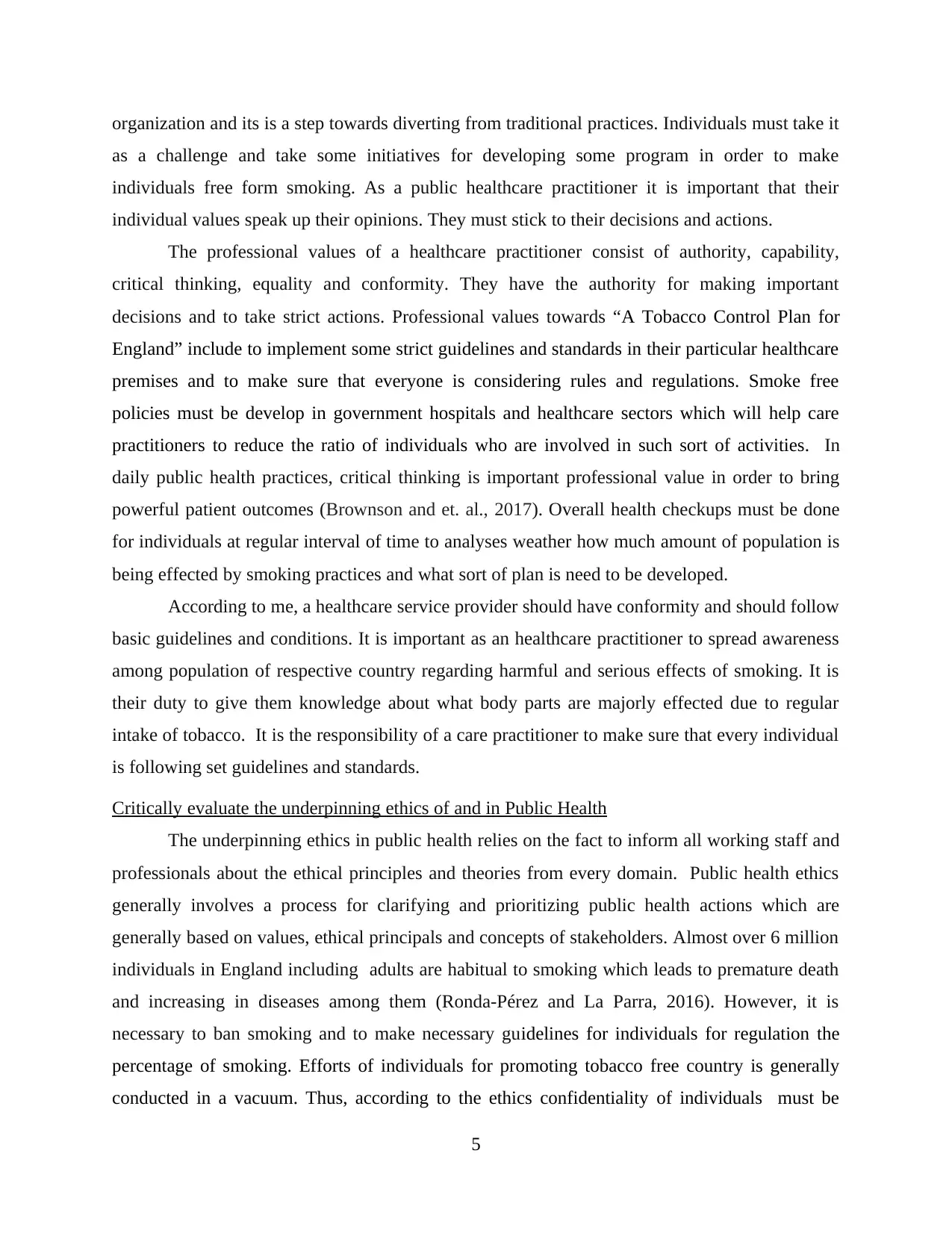
organization and its is a step towards diverting from traditional practices. Individuals must take it
as a challenge and take some initiatives for developing some program in order to make
individuals free form smoking. As a public healthcare practitioner it is important that their
individual values speak up their opinions. They must stick to their decisions and actions.
The professional values of a healthcare practitioner consist of authority, capability,
critical thinking, equality and conformity. They have the authority for making important
decisions and to take strict actions. Professional values towards “A Tobacco Control Plan for
England” include to implement some strict guidelines and standards in their particular healthcare
premises and to make sure that everyone is considering rules and regulations. Smoke free
policies must be develop in government hospitals and healthcare sectors which will help care
practitioners to reduce the ratio of individuals who are involved in such sort of activities. In
daily public health practices, critical thinking is important professional value in order to bring
powerful patient outcomes (Brownson and et. al., 2017). Overall health checkups must be done
for individuals at regular interval of time to analyses weather how much amount of population is
being effected by smoking practices and what sort of plan is need to be developed.
According to me, a healthcare service provider should have conformity and should follow
basic guidelines and conditions. It is important as an healthcare practitioner to spread awareness
among population of respective country regarding harmful and serious effects of smoking. It is
their duty to give them knowledge about what body parts are majorly effected due to regular
intake of tobacco. It is the responsibility of a care practitioner to make sure that every individual
is following set guidelines and standards.
Critically evaluate the underpinning ethics of and in Public Health
The underpinning ethics in public health relies on the fact to inform all working staff and
professionals about the ethical principles and theories from every domain. Public health ethics
generally involves a process for clarifying and prioritizing public health actions which are
generally based on values, ethical principals and concepts of stakeholders. Almost over 6 million
individuals in England including adults are habitual to smoking which leads to premature death
and increasing in diseases among them (Ronda-Pérez and La Parra, 2016). However, it is
necessary to ban smoking and to make necessary guidelines for individuals for regulation the
percentage of smoking. Efforts of individuals for promoting tobacco free country is generally
conducted in a vacuum. Thus, according to the ethics confidentiality of individuals must be
5
as a challenge and take some initiatives for developing some program in order to make
individuals free form smoking. As a public healthcare practitioner it is important that their
individual values speak up their opinions. They must stick to their decisions and actions.
The professional values of a healthcare practitioner consist of authority, capability,
critical thinking, equality and conformity. They have the authority for making important
decisions and to take strict actions. Professional values towards “A Tobacco Control Plan for
England” include to implement some strict guidelines and standards in their particular healthcare
premises and to make sure that everyone is considering rules and regulations. Smoke free
policies must be develop in government hospitals and healthcare sectors which will help care
practitioners to reduce the ratio of individuals who are involved in such sort of activities. In
daily public health practices, critical thinking is important professional value in order to bring
powerful patient outcomes (Brownson and et. al., 2017). Overall health checkups must be done
for individuals at regular interval of time to analyses weather how much amount of population is
being effected by smoking practices and what sort of plan is need to be developed.
According to me, a healthcare service provider should have conformity and should follow
basic guidelines and conditions. It is important as an healthcare practitioner to spread awareness
among population of respective country regarding harmful and serious effects of smoking. It is
their duty to give them knowledge about what body parts are majorly effected due to regular
intake of tobacco. It is the responsibility of a care practitioner to make sure that every individual
is following set guidelines and standards.
Critically evaluate the underpinning ethics of and in Public Health
The underpinning ethics in public health relies on the fact to inform all working staff and
professionals about the ethical principles and theories from every domain. Public health ethics
generally involves a process for clarifying and prioritizing public health actions which are
generally based on values, ethical principals and concepts of stakeholders. Almost over 6 million
individuals in England including adults are habitual to smoking which leads to premature death
and increasing in diseases among them (Ronda-Pérez and La Parra, 2016). However, it is
necessary to ban smoking and to make necessary guidelines for individuals for regulation the
percentage of smoking. Efforts of individuals for promoting tobacco free country is generally
conducted in a vacuum. Thus, according to the ethics confidentiality of individuals must be
5
Paraphrase This Document
Need a fresh take? Get an instant paraphrase of this document with our AI Paraphraser
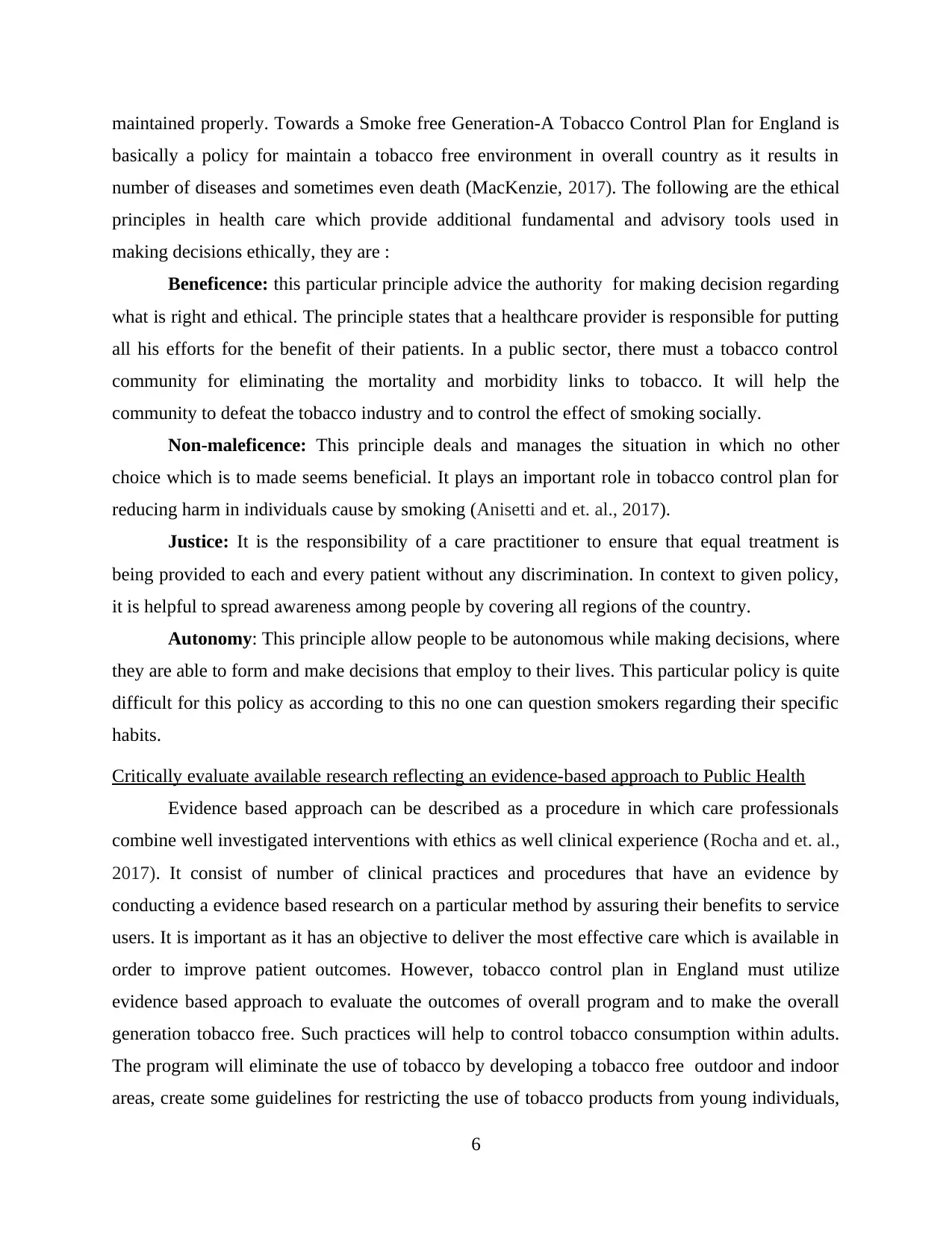
maintained properly. Towards a Smoke free Generation-A Tobacco Control Plan for England is
basically a policy for maintain a tobacco free environment in overall country as it results in
number of diseases and sometimes even death (MacKenzie, 2017). The following are the ethical
principles in health care which provide additional fundamental and advisory tools used in
making decisions ethically, they are :
Beneficence: this particular principle advice the authority for making decision regarding
what is right and ethical. The principle states that a healthcare provider is responsible for putting
all his efforts for the benefit of their patients. In a public sector, there must a tobacco control
community for eliminating the mortality and morbidity links to tobacco. It will help the
community to defeat the tobacco industry and to control the effect of smoking socially.
Non-maleficence: This principle deals and manages the situation in which no other
choice which is to made seems beneficial. It plays an important role in tobacco control plan for
reducing harm in individuals cause by smoking (Anisetti and et. al., 2017).
Justice: It is the responsibility of a care practitioner to ensure that equal treatment is
being provided to each and every patient without any discrimination. In context to given policy,
it is helpful to spread awareness among people by covering all regions of the country.
Autonomy: This principle allow people to be autonomous while making decisions, where
they are able to form and make decisions that employ to their lives. This particular policy is quite
difficult for this policy as according to this no one can question smokers regarding their specific
habits.
Critically evaluate available research reflecting an evidence-based approach to Public Health
Evidence based approach can be described as a procedure in which care professionals
combine well investigated interventions with ethics as well clinical experience (Rocha and et. al.,
2017). It consist of number of clinical practices and procedures that have an evidence by
conducting a evidence based research on a particular method by assuring their benefits to service
users. It is important as it has an objective to deliver the most effective care which is available in
order to improve patient outcomes. However, tobacco control plan in England must utilize
evidence based approach to evaluate the outcomes of overall program and to make the overall
generation tobacco free. Such practices will help to control tobacco consumption within adults.
The program will eliminate the use of tobacco by developing a tobacco free outdoor and indoor
areas, create some guidelines for restricting the use of tobacco products from young individuals,
6
basically a policy for maintain a tobacco free environment in overall country as it results in
number of diseases and sometimes even death (MacKenzie, 2017). The following are the ethical
principles in health care which provide additional fundamental and advisory tools used in
making decisions ethically, they are :
Beneficence: this particular principle advice the authority for making decision regarding
what is right and ethical. The principle states that a healthcare provider is responsible for putting
all his efforts for the benefit of their patients. In a public sector, there must a tobacco control
community for eliminating the mortality and morbidity links to tobacco. It will help the
community to defeat the tobacco industry and to control the effect of smoking socially.
Non-maleficence: This principle deals and manages the situation in which no other
choice which is to made seems beneficial. It plays an important role in tobacco control plan for
reducing harm in individuals cause by smoking (Anisetti and et. al., 2017).
Justice: It is the responsibility of a care practitioner to ensure that equal treatment is
being provided to each and every patient without any discrimination. In context to given policy,
it is helpful to spread awareness among people by covering all regions of the country.
Autonomy: This principle allow people to be autonomous while making decisions, where
they are able to form and make decisions that employ to their lives. This particular policy is quite
difficult for this policy as according to this no one can question smokers regarding their specific
habits.
Critically evaluate available research reflecting an evidence-based approach to Public Health
Evidence based approach can be described as a procedure in which care professionals
combine well investigated interventions with ethics as well clinical experience (Rocha and et. al.,
2017). It consist of number of clinical practices and procedures that have an evidence by
conducting a evidence based research on a particular method by assuring their benefits to service
users. It is important as it has an objective to deliver the most effective care which is available in
order to improve patient outcomes. However, tobacco control plan in England must utilize
evidence based approach to evaluate the outcomes of overall program and to make the overall
generation tobacco free. Such practices will help to control tobacco consumption within adults.
The program will eliminate the use of tobacco by developing a tobacco free outdoor and indoor
areas, create some guidelines for restricting the use of tobacco products from young individuals,
6
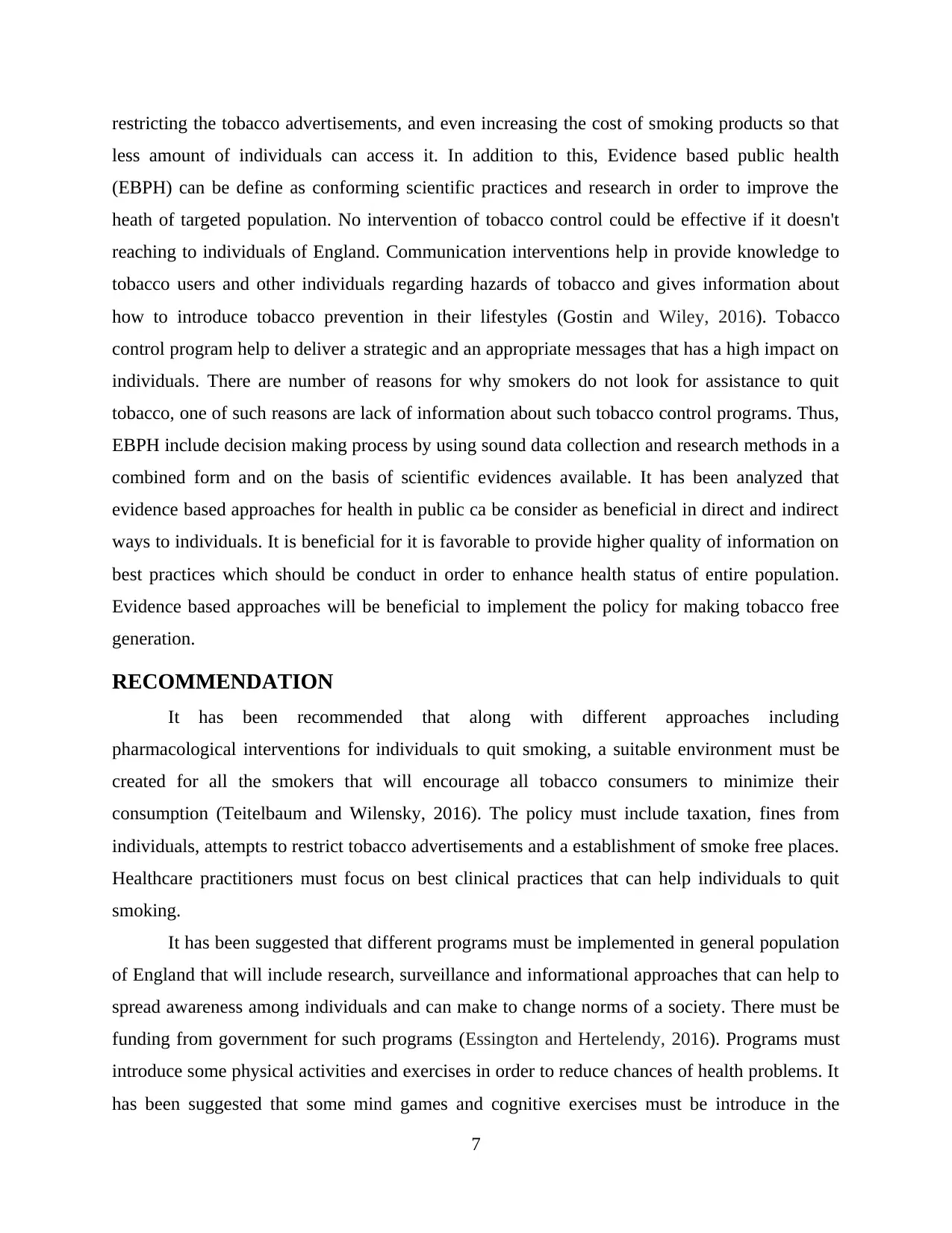
restricting the tobacco advertisements, and even increasing the cost of smoking products so that
less amount of individuals can access it. In addition to this, Evidence based public health
(EBPH) can be define as conforming scientific practices and research in order to improve the
heath of targeted population. No intervention of tobacco control could be effective if it doesn't
reaching to individuals of England. Communication interventions help in provide knowledge to
tobacco users and other individuals regarding hazards of tobacco and gives information about
how to introduce tobacco prevention in their lifestyles (Gostin and Wiley, 2016). Tobacco
control program help to deliver a strategic and an appropriate messages that has a high impact on
individuals. There are number of reasons for why smokers do not look for assistance to quit
tobacco, one of such reasons are lack of information about such tobacco control programs. Thus,
EBPH include decision making process by using sound data collection and research methods in a
combined form and on the basis of scientific evidences available. It has been analyzed that
evidence based approaches for health in public ca be consider as beneficial in direct and indirect
ways to individuals. It is beneficial for it is favorable to provide higher quality of information on
best practices which should be conduct in order to enhance health status of entire population.
Evidence based approaches will be beneficial to implement the policy for making tobacco free
generation.
RECOMMENDATION
It has been recommended that along with different approaches including
pharmacological interventions for individuals to quit smoking, a suitable environment must be
created for all the smokers that will encourage all tobacco consumers to minimize their
consumption (Teitelbaum and Wilensky, 2016). The policy must include taxation, fines from
individuals, attempts to restrict tobacco advertisements and a establishment of smoke free places.
Healthcare practitioners must focus on best clinical practices that can help individuals to quit
smoking.
It has been suggested that different programs must be implemented in general population
of England that will include research, surveillance and informational approaches that can help to
spread awareness among individuals and can make to change norms of a society. There must be
funding from government for such programs (Essington and Hertelendy, 2016). Programs must
introduce some physical activities and exercises in order to reduce chances of health problems. It
has been suggested that some mind games and cognitive exercises must be introduce in the
7
less amount of individuals can access it. In addition to this, Evidence based public health
(EBPH) can be define as conforming scientific practices and research in order to improve the
heath of targeted population. No intervention of tobacco control could be effective if it doesn't
reaching to individuals of England. Communication interventions help in provide knowledge to
tobacco users and other individuals regarding hazards of tobacco and gives information about
how to introduce tobacco prevention in their lifestyles (Gostin and Wiley, 2016). Tobacco
control program help to deliver a strategic and an appropriate messages that has a high impact on
individuals. There are number of reasons for why smokers do not look for assistance to quit
tobacco, one of such reasons are lack of information about such tobacco control programs. Thus,
EBPH include decision making process by using sound data collection and research methods in a
combined form and on the basis of scientific evidences available. It has been analyzed that
evidence based approaches for health in public ca be consider as beneficial in direct and indirect
ways to individuals. It is beneficial for it is favorable to provide higher quality of information on
best practices which should be conduct in order to enhance health status of entire population.
Evidence based approaches will be beneficial to implement the policy for making tobacco free
generation.
RECOMMENDATION
It has been recommended that along with different approaches including
pharmacological interventions for individuals to quit smoking, a suitable environment must be
created for all the smokers that will encourage all tobacco consumers to minimize their
consumption (Teitelbaum and Wilensky, 2016). The policy must include taxation, fines from
individuals, attempts to restrict tobacco advertisements and a establishment of smoke free places.
Healthcare practitioners must focus on best clinical practices that can help individuals to quit
smoking.
It has been suggested that different programs must be implemented in general population
of England that will include research, surveillance and informational approaches that can help to
spread awareness among individuals and can make to change norms of a society. There must be
funding from government for such programs (Essington and Hertelendy, 2016). Programs must
introduce some physical activities and exercises in order to reduce chances of health problems. It
has been suggested that some mind games and cognitive exercises must be introduce in the
7
⊘ This is a preview!⊘
Do you want full access?
Subscribe today to unlock all pages.

Trusted by 1+ million students worldwide
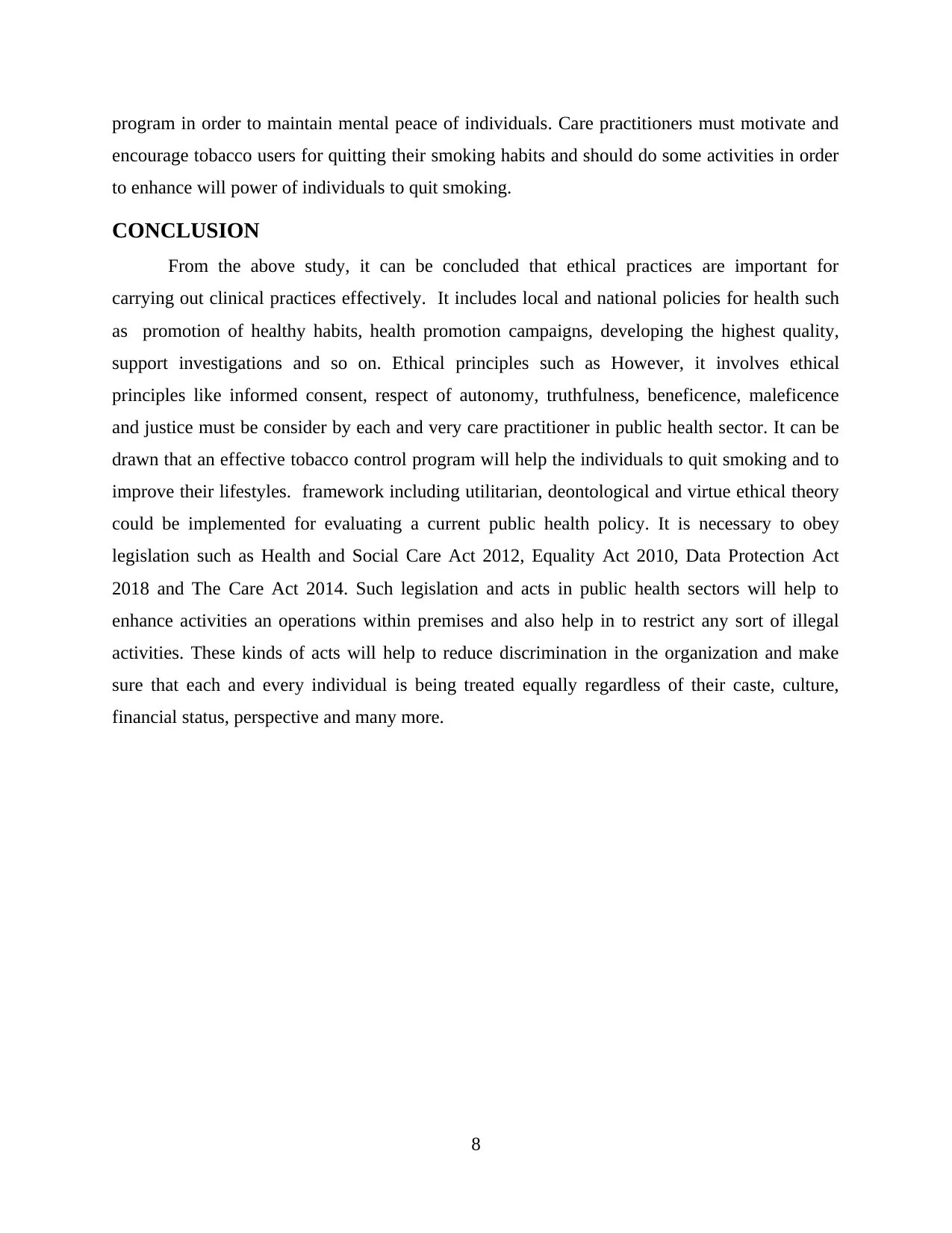
program in order to maintain mental peace of individuals. Care practitioners must motivate and
encourage tobacco users for quitting their smoking habits and should do some activities in order
to enhance will power of individuals to quit smoking.
CONCLUSION
From the above study, it can be concluded that ethical practices are important for
carrying out clinical practices effectively. It includes local and national policies for health such
as promotion of healthy habits, health promotion campaigns, developing the highest quality,
support investigations and so on. Ethical principles such as However, it involves ethical
principles like informed consent, respect of autonomy, truthfulness, beneficence, maleficence
and justice must be consider by each and very care practitioner in public health sector. It can be
drawn that an effective tobacco control program will help the individuals to quit smoking and to
improve their lifestyles. framework including utilitarian, deontological and virtue ethical theory
could be implemented for evaluating a current public health policy. It is necessary to obey
legislation such as Health and Social Care Act 2012, Equality Act 2010, Data Protection Act
2018 and The Care Act 2014. Such legislation and acts in public health sectors will help to
enhance activities an operations within premises and also help in to restrict any sort of illegal
activities. These kinds of acts will help to reduce discrimination in the organization and make
sure that each and every individual is being treated equally regardless of their caste, culture,
financial status, perspective and many more.
8
encourage tobacco users for quitting their smoking habits and should do some activities in order
to enhance will power of individuals to quit smoking.
CONCLUSION
From the above study, it can be concluded that ethical practices are important for
carrying out clinical practices effectively. It includes local and national policies for health such
as promotion of healthy habits, health promotion campaigns, developing the highest quality,
support investigations and so on. Ethical principles such as However, it involves ethical
principles like informed consent, respect of autonomy, truthfulness, beneficence, maleficence
and justice must be consider by each and very care practitioner in public health sector. It can be
drawn that an effective tobacco control program will help the individuals to quit smoking and to
improve their lifestyles. framework including utilitarian, deontological and virtue ethical theory
could be implemented for evaluating a current public health policy. It is necessary to obey
legislation such as Health and Social Care Act 2012, Equality Act 2010, Data Protection Act
2018 and The Care Act 2014. Such legislation and acts in public health sectors will help to
enhance activities an operations within premises and also help in to restrict any sort of illegal
activities. These kinds of acts will help to reduce discrimination in the organization and make
sure that each and every individual is being treated equally regardless of their caste, culture,
financial status, perspective and many more.
8
Paraphrase This Document
Need a fresh take? Get an instant paraphrase of this document with our AI Paraphraser
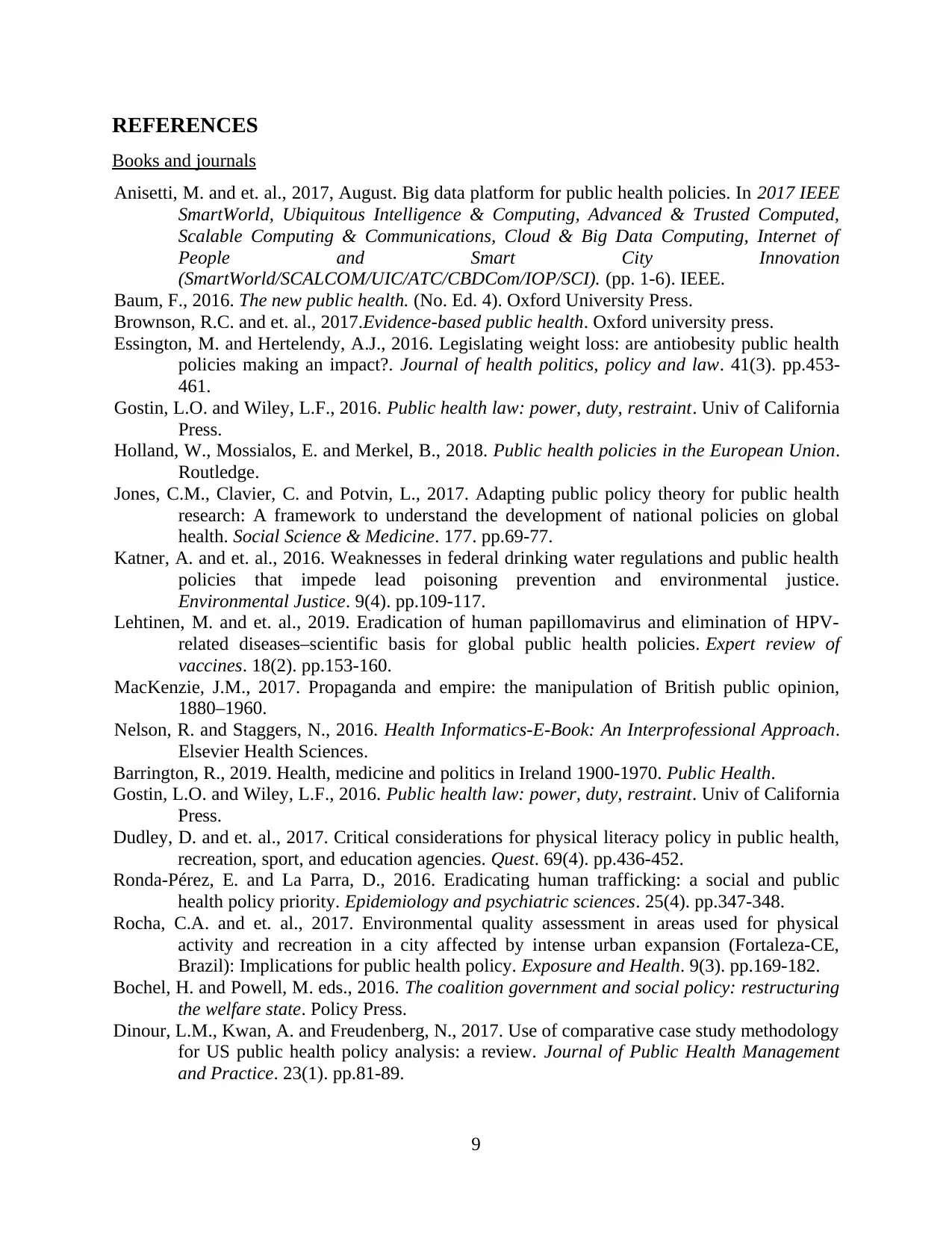
REFERENCES
Books and journals
Anisetti, M. and et. al., 2017, August. Big data platform for public health policies. In 2017 IEEE
SmartWorld, Ubiquitous Intelligence & Computing, Advanced & Trusted Computed,
Scalable Computing & Communications, Cloud & Big Data Computing, Internet of
People and Smart City Innovation
(SmartWorld/SCALCOM/UIC/ATC/CBDCom/IOP/SCI). (pp. 1-6). IEEE.
Baum, F., 2016. The new public health. (No. Ed. 4). Oxford University Press.
Brownson, R.C. and et. al., 2017.Evidence-based public health. Oxford university press.
Essington, M. and Hertelendy, A.J., 2016. Legislating weight loss: are antiobesity public health
policies making an impact?. Journal of health politics, policy and law. 41(3). pp.453-
461.
Gostin, L.O. and Wiley, L.F., 2016. Public health law: power, duty, restraint. Univ of California
Press.
Holland, W., Mossialos, E. and Merkel, B., 2018. Public health policies in the European Union.
Routledge.
Jones, C.M., Clavier, C. and Potvin, L., 2017. Adapting public policy theory for public health
research: A framework to understand the development of national policies on global
health. Social Science & Medicine. 177. pp.69-77.
Katner, A. and et. al., 2016. Weaknesses in federal drinking water regulations and public health
policies that impede lead poisoning prevention and environmental justice.
Environmental Justice. 9(4). pp.109-117.
Lehtinen, M. and et. al., 2019. Eradication of human papillomavirus and elimination of HPV-
related diseases–scientific basis for global public health policies. Expert review of
vaccines. 18(2). pp.153-160.
MacKenzie, J.M., 2017. Propaganda and empire: the manipulation of British public opinion,
1880–1960.
Nelson, R. and Staggers, N., 2016. Health Informatics-E-Book: An Interprofessional Approach.
Elsevier Health Sciences.
Barrington, R., 2019. Health, medicine and politics in Ireland 1900-1970. Public Health.
Gostin, L.O. and Wiley, L.F., 2016. Public health law: power, duty, restraint. Univ of California
Press.
Dudley, D. and et. al., 2017. Critical considerations for physical literacy policy in public health,
recreation, sport, and education agencies. Quest. 69(4). pp.436-452.
Ronda-Pérez, E. and La Parra, D., 2016. Eradicating human trafficking: a social and public
health policy priority. Epidemiology and psychiatric sciences. 25(4). pp.347-348.
Rocha, C.A. and et. al., 2017. Environmental quality assessment in areas used for physical
activity and recreation in a city affected by intense urban expansion (Fortaleza-CE,
Brazil): Implications for public health policy. Exposure and Health. 9(3). pp.169-182.
Bochel, H. and Powell, M. eds., 2016. The coalition government and social policy: restructuring
the welfare state. Policy Press.
Dinour, L.M., Kwan, A. and Freudenberg, N., 2017. Use of comparative case study methodology
for US public health policy analysis: a review. Journal of Public Health Management
and Practice. 23(1). pp.81-89.
9
Books and journals
Anisetti, M. and et. al., 2017, August. Big data platform for public health policies. In 2017 IEEE
SmartWorld, Ubiquitous Intelligence & Computing, Advanced & Trusted Computed,
Scalable Computing & Communications, Cloud & Big Data Computing, Internet of
People and Smart City Innovation
(SmartWorld/SCALCOM/UIC/ATC/CBDCom/IOP/SCI). (pp. 1-6). IEEE.
Baum, F., 2016. The new public health. (No. Ed. 4). Oxford University Press.
Brownson, R.C. and et. al., 2017.Evidence-based public health. Oxford university press.
Essington, M. and Hertelendy, A.J., 2016. Legislating weight loss: are antiobesity public health
policies making an impact?. Journal of health politics, policy and law. 41(3). pp.453-
461.
Gostin, L.O. and Wiley, L.F., 2016. Public health law: power, duty, restraint. Univ of California
Press.
Holland, W., Mossialos, E. and Merkel, B., 2018. Public health policies in the European Union.
Routledge.
Jones, C.M., Clavier, C. and Potvin, L., 2017. Adapting public policy theory for public health
research: A framework to understand the development of national policies on global
health. Social Science & Medicine. 177. pp.69-77.
Katner, A. and et. al., 2016. Weaknesses in federal drinking water regulations and public health
policies that impede lead poisoning prevention and environmental justice.
Environmental Justice. 9(4). pp.109-117.
Lehtinen, M. and et. al., 2019. Eradication of human papillomavirus and elimination of HPV-
related diseases–scientific basis for global public health policies. Expert review of
vaccines. 18(2). pp.153-160.
MacKenzie, J.M., 2017. Propaganda and empire: the manipulation of British public opinion,
1880–1960.
Nelson, R. and Staggers, N., 2016. Health Informatics-E-Book: An Interprofessional Approach.
Elsevier Health Sciences.
Barrington, R., 2019. Health, medicine and politics in Ireland 1900-1970. Public Health.
Gostin, L.O. and Wiley, L.F., 2016. Public health law: power, duty, restraint. Univ of California
Press.
Dudley, D. and et. al., 2017. Critical considerations for physical literacy policy in public health,
recreation, sport, and education agencies. Quest. 69(4). pp.436-452.
Ronda-Pérez, E. and La Parra, D., 2016. Eradicating human trafficking: a social and public
health policy priority. Epidemiology and psychiatric sciences. 25(4). pp.347-348.
Rocha, C.A. and et. al., 2017. Environmental quality assessment in areas used for physical
activity and recreation in a city affected by intense urban expansion (Fortaleza-CE,
Brazil): Implications for public health policy. Exposure and Health. 9(3). pp.169-182.
Bochel, H. and Powell, M. eds., 2016. The coalition government and social policy: restructuring
the welfare state. Policy Press.
Dinour, L.M., Kwan, A. and Freudenberg, N., 2017. Use of comparative case study methodology
for US public health policy analysis: a review. Journal of Public Health Management
and Practice. 23(1). pp.81-89.
9
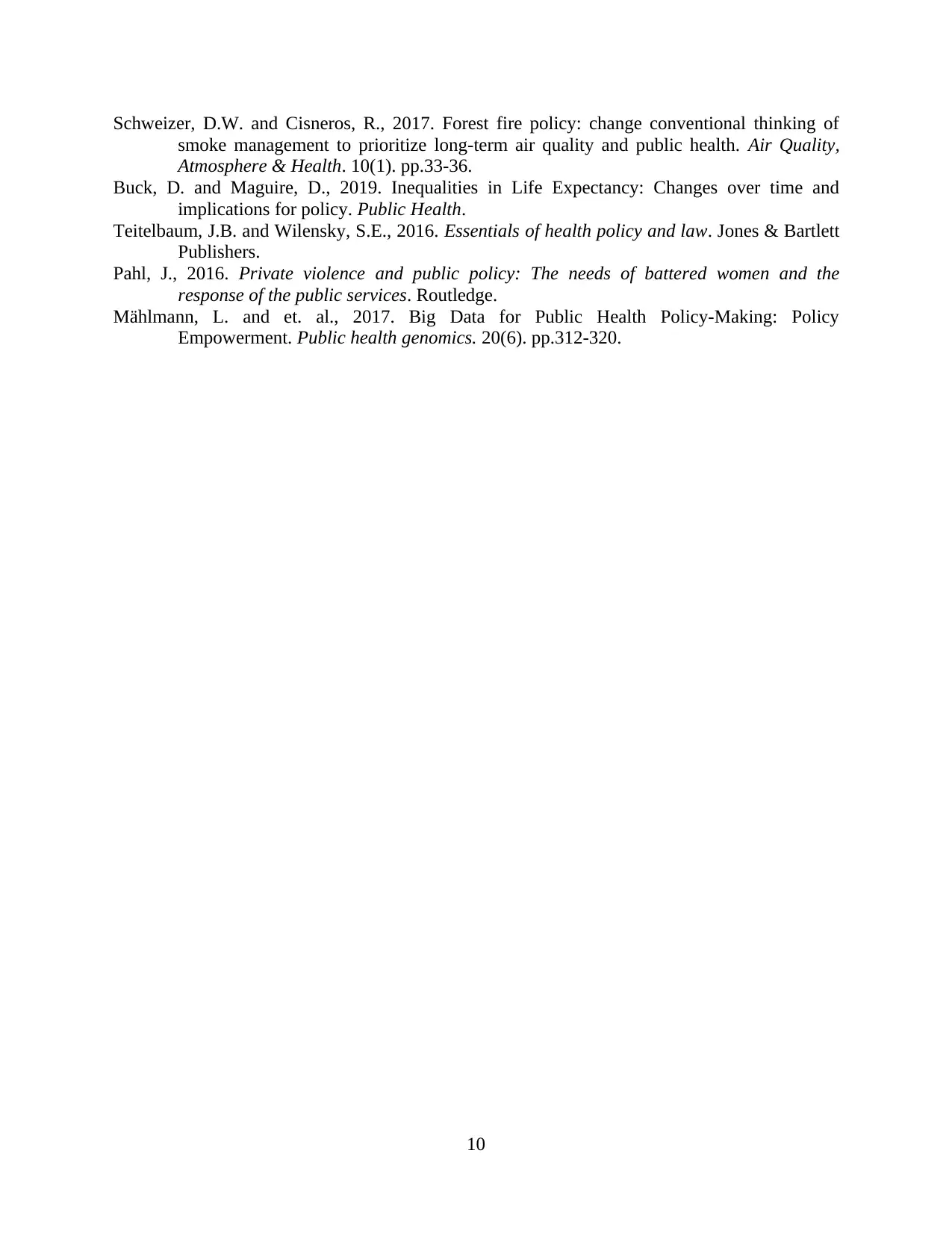
Schweizer, D.W. and Cisneros, R., 2017. Forest fire policy: change conventional thinking of
smoke management to prioritize long-term air quality and public health. Air Quality,
Atmosphere & Health. 10(1). pp.33-36.
Buck, D. and Maguire, D., 2019. Inequalities in Life Expectancy: Changes over time and
implications for policy. Public Health.
Teitelbaum, J.B. and Wilensky, S.E., 2016. Essentials of health policy and law. Jones & Bartlett
Publishers.
Pahl, J., 2016. Private violence and public policy: The needs of battered women and the
response of the public services. Routledge.
Mählmann, L. and et. al., 2017. Big Data for Public Health Policy-Making: Policy
Empowerment. Public health genomics. 20(6). pp.312-320.
10
smoke management to prioritize long-term air quality and public health. Air Quality,
Atmosphere & Health. 10(1). pp.33-36.
Buck, D. and Maguire, D., 2019. Inequalities in Life Expectancy: Changes over time and
implications for policy. Public Health.
Teitelbaum, J.B. and Wilensky, S.E., 2016. Essentials of health policy and law. Jones & Bartlett
Publishers.
Pahl, J., 2016. Private violence and public policy: The needs of battered women and the
response of the public services. Routledge.
Mählmann, L. and et. al., 2017. Big Data for Public Health Policy-Making: Policy
Empowerment. Public health genomics. 20(6). pp.312-320.
10
⊘ This is a preview!⊘
Do you want full access?
Subscribe today to unlock all pages.

Trusted by 1+ million students worldwide
1 out of 12
Related Documents
Your All-in-One AI-Powered Toolkit for Academic Success.
+13062052269
info@desklib.com
Available 24*7 on WhatsApp / Email
![[object Object]](/_next/static/media/star-bottom.7253800d.svg)
Unlock your academic potential
Copyright © 2020–2026 A2Z Services. All Rights Reserved. Developed and managed by ZUCOL.




